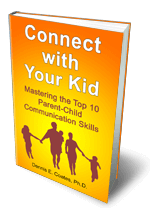When I’m with someone, a friend or family member, or even a stranger, I try to imagine what their experience of being alive in the world is like, based on their situation, experience, values, knowledge, skills, etc. I even do this with our cats. It’s my way of exercising empathy. Doing this exercise with a child causes me to try to remember what my outlook on life was like when I was their age. It’s not easy to imagine my young immature mindset. I had a lot to learn back then.
I was lucky with my parents. They loved me and did everything they could to take care of my basic needs. But it was a large family (eight kids), which left little time for sharing what life wisdom they had. The bottom line: after I left home, my life would become an intense learning journey.
Your child has a lot to learn, too, of course. And their future success and happiness depends on how much they learn. A helpful exercise for parents: when you look at your child, try to imagine what they will be like as an adult. Doing this will help you appreciate how much they have to learn while growing up. Your child needs all the wisdom you can pass along. Not the kind of nonsense they get from their peers. They need the kind of wisdom that comes from many years of life experience. More about this:
Talks: The Window of Opportunity for Wisdom
Wisdom, Choices, and the Life Path
Wisdom for an Adolescent Child
Whether they listen to and value what you have to say will depend on whether you’ve established a bond of trust and affection with your child. A good resource is my book, Connect with Your Kid, a how-to guide for using the ten most important parent-child communication skills.


